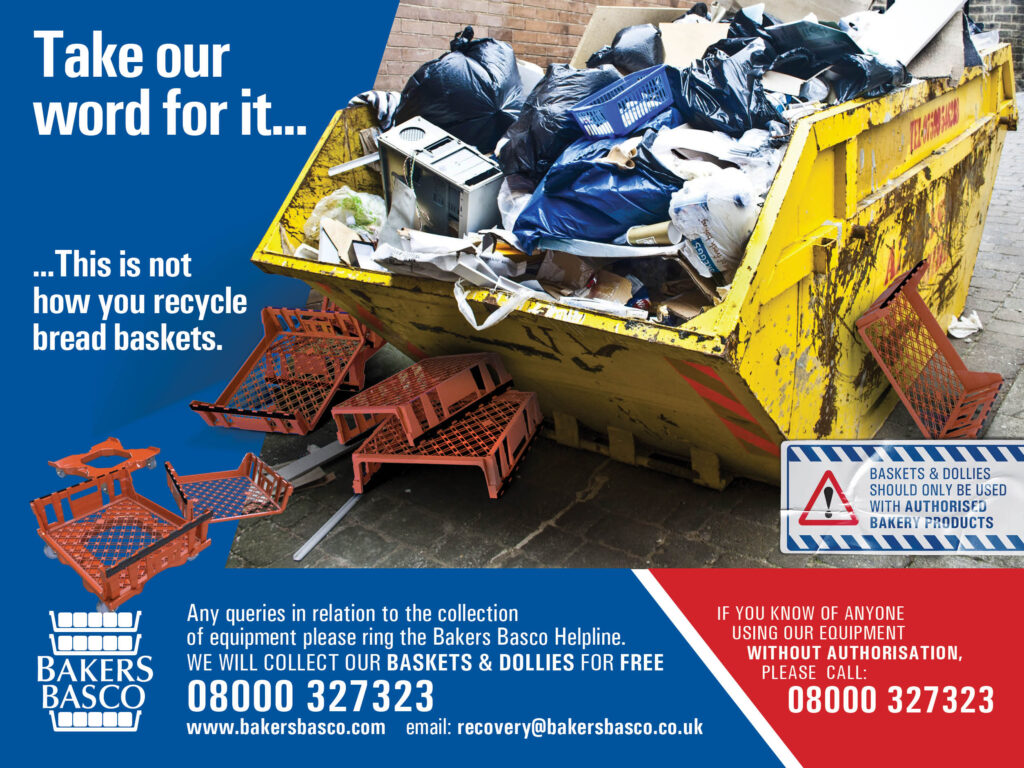By Paul Empson, General manager, Bakers Basco
The news of the UK government’s recent push toward a circular economy is a welcome and much-needed step in reshaping our waste management practices. As part of its plan, the government has launched an initiative to tackle waste and encourage recycling across various sectors. But while the overarching goal is commendable, local authorities and waste management companies need to be particularly vigilant in addressing one area that is too often overlooked: the mismanagement of grocery delivery equipment such as bread baskets and dollies.

At Bakers Basco, we’ve been at the forefront of managing a vast pool of bread baskets and dolly equipment used for transporting bread to retailers across the country. However, our industry has faced a persistent challenge: misplaced or abandoned bakery equipment. Many of these items, which are essential to the logistics of the bakery supply chain, are either inadvertently discarded by waste collection services or sometimes left in public spaces without proper attention. The result is not only waste but a severe environmental impact as these items often end up in landfills instead of being returned to the supply chain where they can be reused.
As part of our commitment to reducing environmental harm, we have made significant strides to prevent this. Through investments in GPS tracking and a dedicated national investigations team, we have worked tirelessly to recover misplaced equipment. However, we are only one part of the puzzle. Local authorities and waste management companies play a crucial role in this transition to a circular economy. We need them to be vigilant in their waste collection practices and recognise the value of grocery delivery equipment in the supply chain.
This isn’t just about reclaiming misplaced baskets; it’s about ensuring that materials are reused, repaired and put back into the economy rather than thrown away. With the UK government’s goal to reduce waste and encourage recycling, local authorities must take active steps to prevent the inadvertent collection of these vital assets. When a bread basket is taken away with general waste, it not only represents a financial loss to the industry but also contributes to the unnecessary production of new plastic products. This is a critical issue and it’s one that we need to address collectively as we transition to a more sustainable economy.

One of the most recent incidents involved the discovery of large quantities of misplaced bread baskets across several locations in a Scottish city. These items were found abandoned in public spaces and while this is an unfortunate scenario it did prompt the local Commercial Waste Enforcement team to act swiftly. They reached out to Bakers Basco for assistance and we were able to arrange for the prompt collection and repatriation of the equipment. This collaborative effort is exactly what needs to happen more frequently across the UK.
For local authorities and waste management companies, this is a call to action: to consider the impact of their waste collection practices and to work with companies like ours to ensure that important materials are not lost in the waste cycle. By being more mindful of grocery delivery equipment in the waste stream, local authorities can play a pivotal role in the circular economy. It’s about ensuring that equipment like bread baskets, which are often used hundreds of times, is not discarded needlessly, but returned for reuse, reducing the need for additional production and saving resources.
The government’s vision for a circular economy is one that I fully support, but the success of this transition will require more than just policy changes. It requires a fundamental shift in how we view materials and waste. Local authorities must be part of this shift, ensuring that waste management processes are aligned with the principles of reuse and sustainability. We are more than prepared to collaborate with or assist the Circular Economy Taskforce should they need inside knowledge or additional support. The time to act is now, and through effective partnerships, we can all contribute to a circular economy that works for everyone.
For anyone who comes across these baskets, please contact the Bakers Basco team, who are willing to arrange collections for free. You can report via the recovery helpline: 08000 327323 or email: enquiries@bakersbasco.co.uk.






Recent Comments